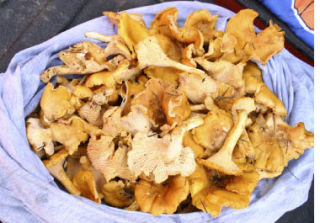Searching for chantrelles, and the meaning of democracy, in the woods of North Kitsap with John and Dorian from Mor Mor Bistro.
WBy BILL MICKELSON
Today, indeed, the historic election of 2008 is over.
The people have spoken, the democratic engine of America has turned over, the leaders of tomorrow are now here today … and all that cliche.
It’s easy, in an election season, to get lost in the schtick. It’s easy to get caught up in the candidates and the issues — and the ads — and lose sight of what it’s really all about. Democracy.
Each year that elections are held and campaigns are run is another example of the democratic system, on which the country was built and on which we stand, working its magic. Or voodoo, depending on one’s perspective.
Either way, it goes without saying that this year was big. So in an effort to better understand the system and its purpose, before casting my vote, I abandoned the candidates and their campaigns last Sunday morning and went mushroom hunting through a forest in North Kitsap with John Nesby and Dorian Woodson of Poulsbo’s Mor Mor Bistro.
And, somewhat surprisingly, I found some clarity.
“Every time we come out, we’re surprised,” said Nesby chef/owner of Mor Mor.
Seasoned pickers, he and Woodson comb the woods around Puget Sound each fall, looking for edible forest floor mushrooms called chantrelles to stock their personal kitchens.
On the surface, our trip seemed almost irrelevant — for Nesby and Woodson, who felt the season for chantrelles was pretty much all but over, and for me, seeking the wisdom on democracy through mycology. But, we actually ended up with a fairly decent late season harvest. And after a few hours in the woods, we found a few fundamental similarities between the processes of voting and mushroom hunting.
In both politics and picking, the general process is wading through a dense thickets of information with patience and observance and a trained eye, while expecting the unexpected.
Most obviously:
You must do the research
If you pick the wrong mushroom, it can kill you. The same — although hopefully to a lesser degree with checks and balances, power of the people and whatnot — can be also said for the wrong candidate, or the wrong ballot measure, or the wrong initiative. But, of course, the devil resides in the details.
The trouble is picking mushrooms, similar to picking candidates, is quite a complex endeavor.
Fungus, also similar to politics, has long been a mysterious organism.
However, its vast number species make up one of the largest divisions of the plant kingdom. They are connected by intricate underground networks. They can multiply by the millions, yet they depend on their environment to survive.
The same can also apply, again to a lesser degree, to a given field of candidates.
Luckily, for both pickers and voters, both mushrooms and candidates are documented in comprehensive manuals — field guides and voters pamphlets.
Only voters pamphlets don’t designate which are potentially toxic.
“And the thing about chantrelles (the good mushrooms) is you might not even see them at first, until you stop and look around from different perspectives,” Woodson said.
Beware of
look-a-likes
Another thing about chantrelles is they’ve got a few different look-a-likes, that are similar in shape and color but not in edibility.
“And the good ones and the bad ones live in the exact same neighborhood,” Nesby said.
In fact on our trip, we found a false chantrelle growing right next to a quality chantrelle, so close the two were nearly touching. Both the same height and same shape you could tell them apart because the bad one had a dark ring around its cap and the other was a solid color.
Sounds eerily similar to politics, though you can’t always see the dark side at face value. While for mushrooms, there are additional tests to tell the good from bad, politicians tests are in public forums and in public media.
When in doubt, throw it out
“Whenever I come out, just looking for edible (mushrooms), there’s probably four varieties that I trust enough to put in my mouth,” Nesby said. “And I’m only going to take what I’m 100 percent sure of.”
This, the most common rule of the kitchen — “when in doubt, throw it out” — seems like it could and should also be applied to politics, as it is in this case applied to mushrooms.
And while it’s not always so easy to toss out a rotten elected leader out once he/she is in office, it seems like the principle applies quite well to the ballot.
In either case, it’s all about decision making.



